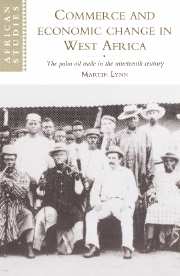Book contents
- Frontmatter
- Contents
- List of maps
- List of tables
- Preface
- List of abbreviations
- Introduction
- Part I The development of the palm oil trade in the first half of the nineteenth century
- Part II The restructuring of the palm products trade in the second half of the nineteenth century
- 5 Technological change, the British market, and African producers
- 6 British traders and the restructuring of the palm products trade
- 7 African brokers and the struggle for the palm products trade
- 8 The coming of colonial rule and the ending of legitimate trade
- Conclusion
- Notes
- Select bibliography
- Index
- Other books in the series
6 - British traders and the restructuring of the palm products trade
Published online by Cambridge University Press: 04 December 2009
- Frontmatter
- Contents
- List of maps
- List of tables
- Preface
- List of abbreviations
- Introduction
- Part I The development of the palm oil trade in the first half of the nineteenth century
- Part II The restructuring of the palm products trade in the second half of the nineteenth century
- 5 Technological change, the British market, and African producers
- 6 British traders and the restructuring of the palm products trade
- 7 African brokers and the struggle for the palm products trade
- 8 The coming of colonial rule and the ending of legitimate trade
- Conclusion
- Notes
- Select bibliography
- Index
- Other books in the series
Summary
The development of the steamship services between Britain and West Africa after 1852 led to major changes on the British side of the palm oil trade. These changes amounted to a major restructuring; it was at this time, as Zeleza suggests, that the old slaving organisation of the West African trade was abandoned. As we have seen, this was a time of increasing difficulties for the trade. From the early 1860s oil prices began to fall, while from the mid-1870s the value of the trade began to decline, a process that culminated in the crisis of the 1880s. As the market shrank, this became a time of marked competitiveness for palm oil traders. This process was exacerbated by the changes in the trade generated by the establishment of the steamship services. The combination of price falls with the impact of the steamers meant that the late nineteenth century was to be a time of great stress for the oil trade; for established British traders in particular, it was to be a period of immense change and difficulty.
The reorganisation of the trade derived ultimately from the introduction of the steamship services. The steamers set in motion many changes, not least of which arose from their impact on British ports in the oil trade. On a general level, the steamship services concentrated the trade on Liverpool. As has been seen, Liverpool's pre-eminence in the African trade had come to be challenged by the emergence of traders from Bristol and London during the 1830s and 1840s; Liverpool's share of palm oil imports, calculated in terms of casks of oil, dropped from 96 per cent in 1830 to 68 per cent by 1850, albeit within a trade that was expanding overall.
- Type
- Chapter
- Information
- Commerce and Economic Change in West AfricaThe Palm Oil Trade in the Nineteenth Century, pp. 128 - 150Publisher: Cambridge University PressPrint publication year: 1997



